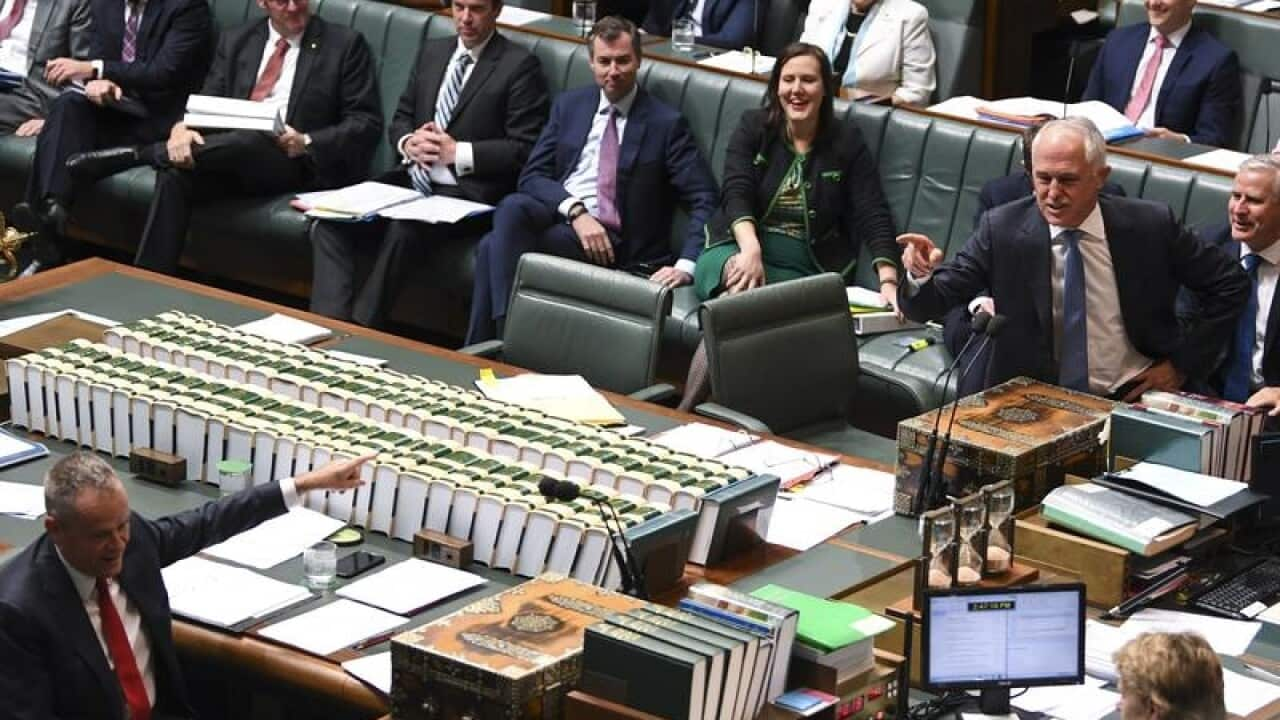The Turnbull government’s full set of income tax cuts has passed the Senate with the support of One Nation and the Centre Alliance.
The landmark tax reform was the centrepiece of the government's 2018 Budget and will form a key part of its pitch to voters in the lead-up to the next federal election.
The first round of tax cuts will take effect on July 1, but taxpayers will not see the money until they lodge their tax returns at the end of the next financial year. Those earning up to $125,000 per year will receive a tax offset of up to $530 when they file their return.
The two minor parties gave the Coalition the final votes needed for the bill to pass - although the Centre Alliance said it would help a future government undo some of the long-term tax cuts included in the plan.
The package includes immediate tax cuts for low- and middle-income earners this year, kicking in on July 1, as well as future rounds of cuts in 2022 and 2024 that mostly benefit higher earners.
The cuts will cost the treasury $144 billion over the first 10 years, according to the Parliamentary Budget Office.
"This is the most comprehensive reform of personal income tax in a generation," Prime Minister Malcolm Turnbull said.
"It says to Australian families: we believe in you. We believe in your aspirations. We want you to realise your dreams. We want you to keep more of the money you have earned."
The bill passed with the crucial support of One Nation leader Pauline Hanson, who admitted the decision was a "dilemma".
"To tell you the truth, it's actually the people of Australia that actually are going to win out of this and that's why we have supported it," Senator Hanson told reporters after the vote.
Senator Hanson had previously shared the concerns of Labor, independent Tim Storer and the Centre Alliance about the cost of stage three – the 2024 cut that would remove an entire tax bracket so those earning between $41,000 and $200,000 are taxed at the same marginal rate.
She said One Nation still had concerns about the cost of the plan, but was reassured the government could still deliver a return to surplus within two years.
"It was a dilemma for me because I have spoken about the [budget] black hole and the money we owe," she said.
One Nation also claims to have secured 1,000 government-supported apprenticeship places in exchange for its support. The Coalition confirmed it would consider a "trial".
"I will be pleased if I can get that," Senator Hanson said.
Finance Minister Mathias Cormann, the government's chief negotiator in the Senate, said Labor had tried to stand in the way of tax cuts for "working families".
"We're very grateful to the crossbench for having overwhelmingly supported the government on this," Senator Cormann said.
Labor supported the 2018 cuts but opposed the later rounds, claiming the lost revenue will result in cuts to government services like health and education in the future.
"Today, the fiscal recklessness and addiction to unfairness of the Turnbull government is perhaps starker than it's ever been," Labor's shadow treasurer Chris Bowen said.
"The government that used to lecture us about Budget responsibility and debt and deficit disaster ... celebrates when it locks in $140 billion of income tax cuts, when they can give no certainty, no guarantees, about whether they are affordable or sustainable."
Labor has promised bigger tax cuts for low income earners, around double the $500 per year the Coalition is offering, but does not support the later cuts for higher earners.
"The Labor party believes in responsible budgeting, prudent budgeting, careful budgeting. We do not believe in locking in unaffordable promises, six or seven years in advance," Mr Bowen said.
The Coalition tax cuts were dealt a blow on Wednesday when by stripping away the 2024 cuts.
But the Turnbull government immediately reattempted the bill in full and triggered another vote on Thursday.
The bill passed with the support of nearly the entire crossbench, with only the independent senator Tim Storer siding with Labor and the Greens in opposition.
The “loose alliance” of independent conservatives – senators Leyonhjelm, Bernardi and Anning – all voted with the government, as did the outspoken independent Derryn Hinch. Ex-One Nation senator Brian Burston, now in Clive Palmer’s new party, also supported the full package.
In the end it was the votes of the Centre Alliance party that tipped the balance, even though the party does not support the 2024 cuts.
Explaining the decision, Senator Rex Patrick said the party faced the "dilemma" of not wanting to deprive low-income earners in the short-term. The party would have "years" and at least two election cycles to reverse 'stage three' of the plan.
Labor has promised to reverse the 2022 and 2024 cuts if it wins the next election.











